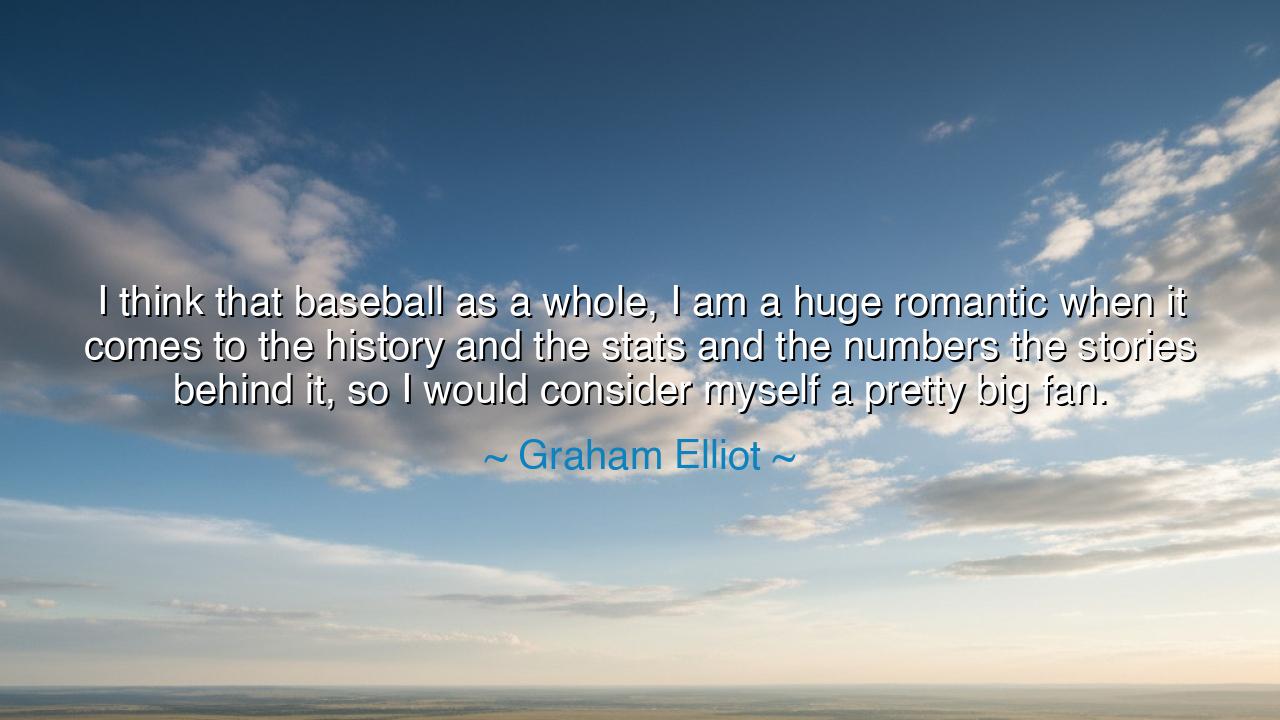
I think that baseball as a whole, I am a huge romantic when it
I think that baseball as a whole, I am a huge romantic when it comes to the history and the stats and the numbers the stories behind it, so I would consider myself a pretty big fan.






Graham Elliot, with the heart of a dreamer and the eyes of one who sees beyond mere sport, once declared: “I think that baseball as a whole, I am a huge romantic when it comes to the history and the stats and the numbers, the stories behind it, so I would consider myself a pretty big fan.” These words reveal not only the affection of a man for a game, but the deeper truth that human beings are moved not by rules and scores alone, but by the stories and legacies that give meaning to them. To be a romantic about baseball is to see in it not just the swing of the bat or the roar of the crowd, but the poetry of generations woven together through tradition, memory, and myth.
The ancients too knew this way of love. They did not revere the Olympic Games merely for strength and speed, but for the stories of the heroes who competed. They remembered Milon of Croton, who won wrestling again and again, not because of numbers alone, but because his feats became legend. So too in baseball: the numbers—home runs, strikeouts, averages—are not cold measures but sparks that ignite memory, that carry forward the greatness of Babe Ruth, Jackie Robinson, Hank Aaron, and others whose deeds transcended the field. Elliot’s romance with the game is a reverence for this living chain of memory.
Consider the tale of Jackie Robinson, who broke the color barrier in 1947. His batting average and stolen bases tell one part of the story, but the true romance is in the courage he carried onto the field, facing jeers and hatred with dignity. His numbers become symbols, but the story is the flame: one man’s triumph becoming a triumph for all. To be a romantic in baseball is to know that every statistic is but the shadow of a greater human tale.
Or think of Lou Gehrig, who stood before the crowd at Yankee Stadium and, even as disease claimed his strength, declared himself the luckiest man on the face of the earth. His stats speak of greatness—493 home runs, 2,130 consecutive games played—but his story speaks of grace, gratitude, and love. Elliot’s words remind us that to cherish baseball is to cherish not only the scorecard, but the soul behind it. The romance lies not in calculation alone, but in the human spirit revealed through the game.
Elliot’s love for the history of baseball also points to something greater: that tradition is a source of meaning. Just as the historian looks back upon the deeds of empires, and the philosopher studies the thoughts of the wise, so the fan of baseball looks back upon the great innings, the legendary rivalries, the moments that shaped the sport. Each pitch and play becomes part of a grand narrative, and to be a true romantic is to see this tapestry, not merely the single thread.
The lesson is clear: whether in games, in art, or in life, we must seek the stories behind the numbers, the meaning behind the measurement. Facts and figures may inform us, but it is the human tale—the sweat, the courage, the triumph, the loss—that touches our hearts. To live as a romantic is to live awake to this truth, to honor tradition, to remember the past, and to see in each moment not only what it is, but what it signifies.
So I say to you, seekers of meaning: be like Graham Elliot. Whatever your passion, do not love it for the surface alone. Learn its history, cherish its stories, honor those who came before you. Let the numbers not stand cold upon a page, but let them sing as echoes of human effort, human greatness, and human love. For in this lies the true romance of life: to find beauty not only in the moment, but in the memory that endures.






AAdministratorAdministrator
Welcome, honored guests. Please leave a comment, we will respond soon